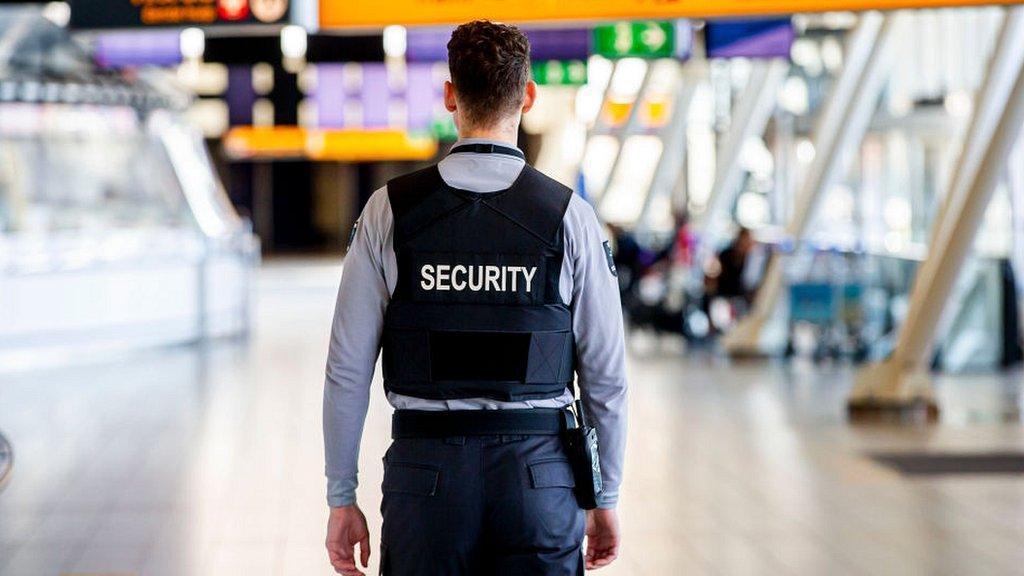Coronavirus: EU entry ban hits travellers as lockdown widens
- Published
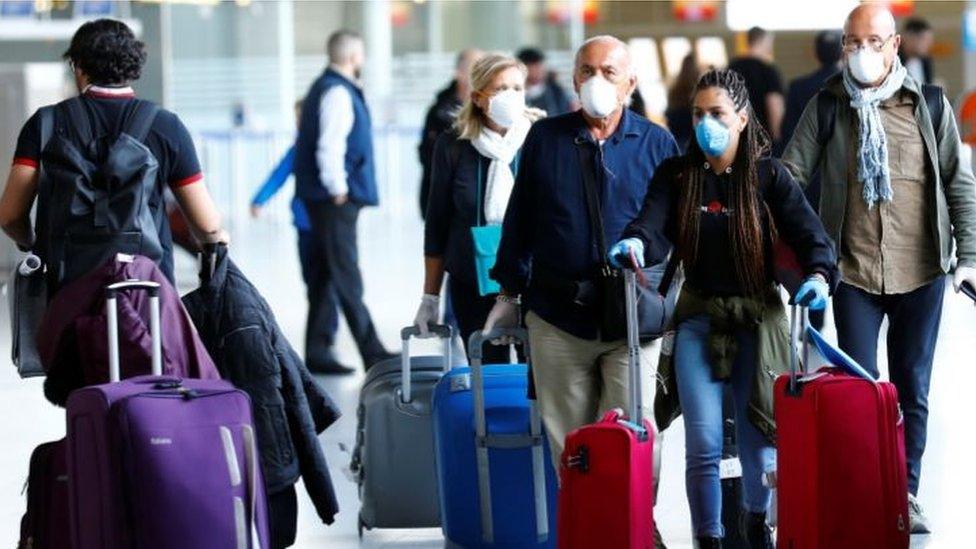
Passengers wear protective masks as they arrive at Frankfurt airport on Tuesday
Travellers from outside the EU are being turned away from airports and borders after the 27-country bloc imposed a 30-day ban to halt the spread of coronavirus.
A group flying in from Turkey was turned away from Germany’s biggest airport in Frankfurt late on Tuesday, DPA news agency reports.
EU leaders agreed that internal borders that have been erected in recent days should come down.
Many Europeans work across borders.
At least 8,248 people have died and 205,452 people have been infected worldwide, according to Johns Hopkins University. Europe has been identified by the WHO as the "epicentre of the epidemic".
In the EEA (European Economic Area), which includes the EU states and the UK, at least 3,426 people have died and 35,329 have been infected, with Italy and Spain hit particularly badly.
Belgium is the latest EU country to introduce a lockdown for its 11.4 million citizens.
People have been urged to stay at home as much as possible and only essential travel will be allowed. Most shops will close, but physical activity is allowed as long as people respect social distancing.
The Swiss government has also told its citizens to stay at home, while Serbia has told over-65s to stay indoors and imposed a night-time curfew on everyone.
In another blow to the continent's normal life, the Eurovision Song Contest has been cancelled. The 64-year-old event, which has a big global following, was due to take place in the Dutch city of Rotterdam in May.
What has the EU agreed?
The 30-day entry ban will not affect Europeans going home or cross-border workers. UK citizens are also not affected by it because an interim Brexit deal still ties the UK to EU rules.


LIVE UPDATES: Follow the latest developments here
EASY STEPS: How to keep safe
A SIMPLE GUIDE: What are the symptoms?
NEW MEASURES: What is the UK advice?
TRAVEL PLANS: What are your rights?

The ban specifically covers all EU states as well as countries within the Schengen border-free zone, including Iceland, Switzerland, Norway and Liechtenstein.
All citizens will be given help returning home, and Germany on Wednesday said it would continue a drive to fly home tens of thousands of tourists stranded abroad, from Morocco and Egypt to the Philippines and Argentina.
The Robert Koch Institute (RKI), the scientific body advising the government on health issues, has warned that Germany could see up to 10 million cases of coronavirus infections within the next two to three months unless the current containment measures are strictly followed.
Why are internal borders a problem?
Individual European governments have begun erecting patrols to stop citizens from other countries from entering.
Patrols appeared on Tuesday on the Spanish border with France, and Poland has seen traffic jams of up to 50km (31 miles) at some of its crossings as part of its health measures.
“It is absolutely crucial that we unblock the situation, because we know that too many people are stranded within the European Union and have a problem to go back home,” said European Commission President Ursula von der Leyen.

Long queues on Polish border
By Adam Easton, BBC News Warsaw
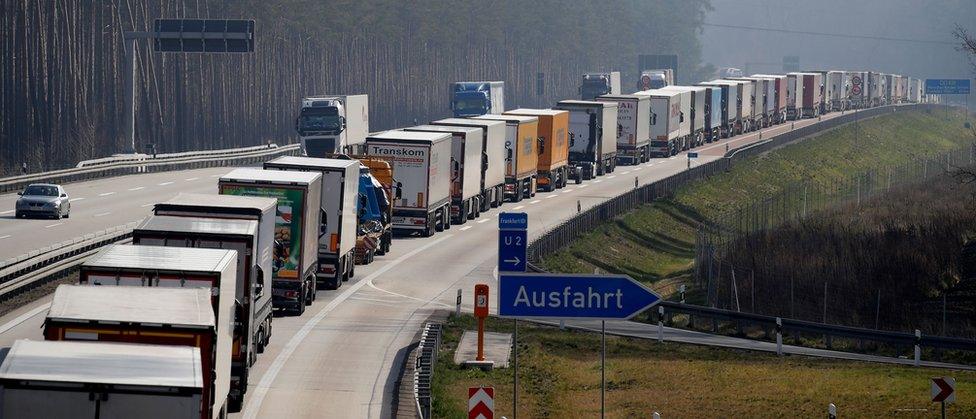
Trucks are stuck in a long traffic jam on a road in Germany about 50km from the Polish border
Some people are having to wait for more than 24 hours following the introduction of checks at midnight on Saturday.
Foreigners are temporarily banned from entering the country and returning Polish citizens must be quarantined for 14 days. Border guards wearing protective suits and face masks are taking the temperature of everyone crossing the border.
Thousands of foreigners are leaving Poland to return home and thousands of Poles are trying to get back in.
And then there are the trucks. The borders are still open to goods, but the authorities did not create special lanes for truck drivers to cross, so everyone is stuck in one line.
At the crossing in Jedrzychowice on the German border on Wednesday morning, people have been stuck in their vehicles overnight, many with nothing to eat or drink and with no access to toilets.

How bad is the situation in Europe?
Italy, which has registered the most cases outside China, has reported 2,503 deaths and 31,506 infections.
Spain now has 598 dead and 13,716 infections. An inquiry is to be launched into the deaths of at least 17 residents of a nursing home in Madrid, where dozens of cases of Covid-19 have been reported.
In France, the number of confirmed cases grew by more than 16% on Tuesday, reaching 7,730, while the death toll rose to 175, with 7% of the dead aged under 65.
In the UK, the number of dead has reached 104.
Germany has 12 deaths and 8,198 cases. Chancellor Merkel is to make the unusual step of speaking to the nation in a TV address later on Wednesday. She is not expected to announce new measures, but rather appeal to citizens to help fight the virus.
Belgium has 14 deaths and 1,486 cases
The cruise ship cancellations have led to cleaner canals in Venice
In an attempt to stop people flouting lockdowns, France's government has increased the fine to between €135 (£123; $144) and €375 - far higher than the initial fine of €38.
In Italy, more than a million checks were carried out by police in the week to 17 March. Almost 43,000 people were found to have breached the lockdown conditions.
The governor of the northern Lombardy region, Attilio Fontana, has begged people to stay at home. The numbers were so high, he said, that "soon we'll be unable to respond to people who fall ill". "We are asking you for a sacrifice to save human life."
What else did the Commission leader say?
Mrs von der Leyen told reporters on Tuesday that she hoped a vaccine could be available by autumn, external. Her comments are out of step with health officials elsewhere, but she said there were means to speed up bureaucratic processes that were normally slow and difficult.
The Commission leader has also given an interview with German tabloid Bild, in which she said: “I think that all of us us who are not experts initially underestimated the coronavirus."
She accepted it was a “worrying enemy” but said she did not see the fight against it as a war. Measures that sounded “drastic, draconian” two weeks ago, she said, were now accepted as necessary.
Covid symptoms: What are they and how long should I self-isolate for?
- Published18 March 2020
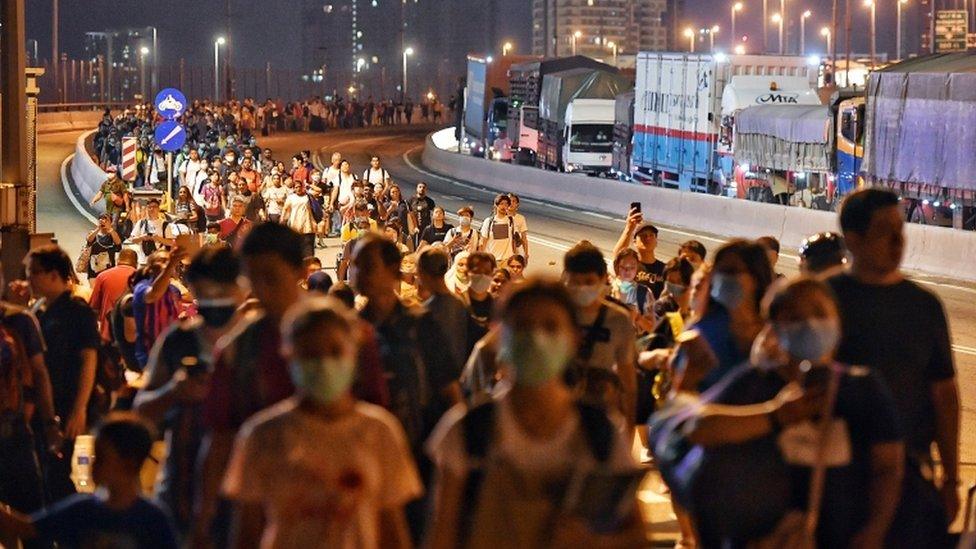
- Published5 July 2022

- Published25 January 2022
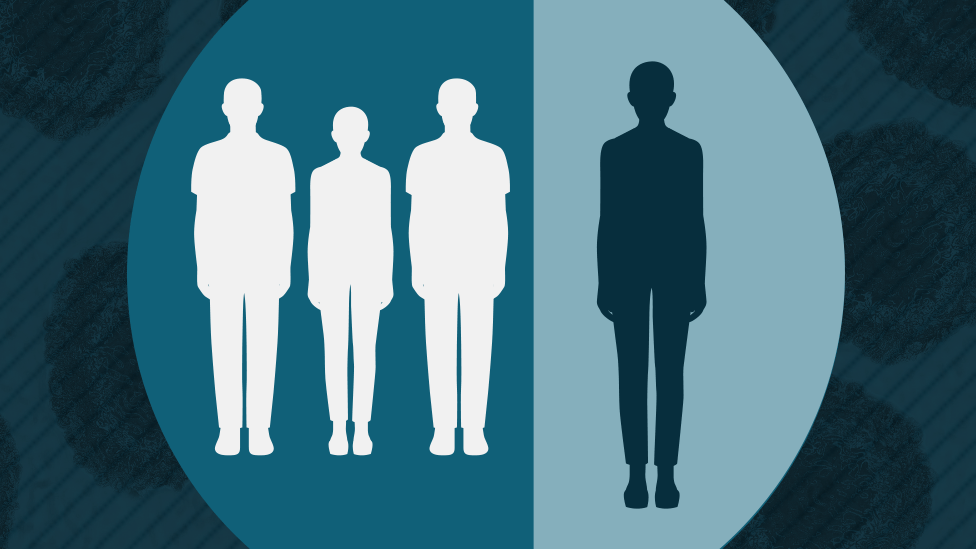
- Published1 April 2020
